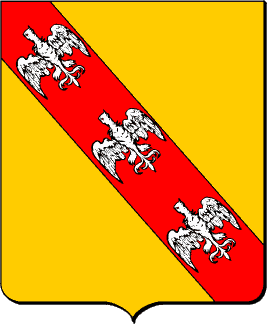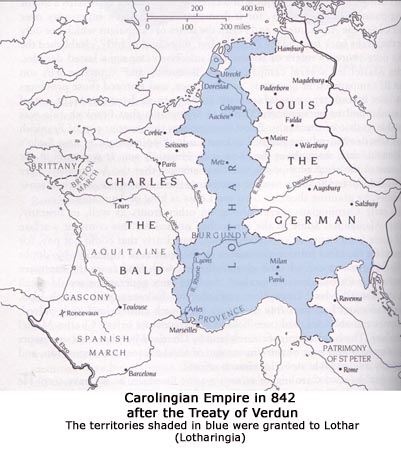Nancy - Duchy of Lorraine
Seat of the Ancient Frankish House d'Ardennes

"Arms of the Dukes of Lorraine"
Seat of the Ancient Frankish House d'Ardennes

"Arms of the Dukes of Lorraine"
Head of State: John I d'Ardennes
Player: Bagricula
Religion: Catholic
Culture: German, French
Stats: 2/0/9/10/2 --> [2/0/9/10/2]
Provinces: 3
Ports: 0
Owned: Lorraine(4), Metz(3), Bar(3)
A heavy joweled red-faced man in dark ochre velvet and a hat two sizes too small lumbers towards visitors brandishing a long thin oak staff. Under the weight of many keys, the iron chain that marks his office as chamberlain sinks into the creases of his coat. He brushes his sweat-laden thinning hair from his forehead and gives you a perfuntory smile before offering his services. The ducal seat has many amenities for visiting royals, nobles, diplomats, and merchant-princes.
Court of Lorraine
I. [anchorlink=news]News and Announcements[/anchorlink]
II. [anchorlink=history]History of Lorraine[/anchorlink]
III. [anchorlink=family]House d'Ardennes[/anchorlink]
IV. [anchorlink=faction]Factions at Court[/anchorlink]
V. [anchorlink=diplo]Diplomacy and Trade[/anchorlink]

[anchor=news]News and Announcements[/anchor]
I. [anchorlink=news]News and Announcements[/anchorlink]
II. [anchorlink=history]History of Lorraine[/anchorlink]
III. [anchorlink=family]House d'Ardennes[/anchorlink]
IV. [anchorlink=faction]Factions at Court[/anchorlink]
V. [anchorlink=diplo]Diplomacy and Trade[/anchorlink]

[anchor=news]News and Announcements[/anchor]
Pentecost Fair - Hear ye! Hear ye! John d'Ardennes has decreed a great fair to celebrate the Feast of the Pentecost in Nancy.
Eligible Bachelor - The rumormongers whisper that Charles d'Ardennes, 19 this spring, has been told by his father to settle down with a fine lass of noble breeding and vast wealth. Matchmakers may begin sending out feelers as soon as all our hearts are a flutter with spring fever. Gossipers even mention a concerted effort to find a match beyond the boundaries of Lord John's dominion.

[anchor=history]History of Lorraine[/anchor]
When the Emperor Lothar I died in 855, his "middle kingdom" (Francia Media) was divided between his three sons: (1) Louis II received Italy and the Imperial crown, (2) Charles, Burgundy, and (3) Lothar II what was left, the area from Burgundy down to the North Sea. There was no traditional name for such an area, so it came to be called after Lothar himself: Lotharingia. This has become Lothringen in German and Lorraine in French and English. The lack of male heirs for all these meant that Italy, Burgundy, and Lorraine all were subsequently divided and passed around among the Carolingian heirs of East and West. Lorraine soon lost independent status and became a dependency, a Stem Duchy, of the East Frankish Kingdom, except briefly when it adhered to the West (911-925). The Duchy itself than became divided between the north, or Upper Lorraine, and the south, or Lower Lorraine (959). "Upper" and "Lower" were in the relation to the river systems in the area. The heart of Upper Lorraine was Nancy, on the Moselle (Mosel in German). Upper Lorraine originally extended all the way down to the Rhine on the Moselle and included Trier, but the border gradually retreated up river, and Trier itself became an independent Ecclesiastical Electorate of the Empire. To the east, Upper Lorraine bordered on Alsace, part of the Duchy of Swabia, on the south, the Free County of Burgundy, and on the west, Champagne. The western border was originally between the Marne and the Meuse (Maas in Dutch). By 1301, France obtained suzerainty over Bar west of the Meuse, which brought the border of the Kingdom of France to the Meuse iself (more or less).

"Lotharingia"
Although it began as a Kingdom on equal footing with Burgundy and Italy, or, for that matter, with West Francia (France) and East Francia (Germany), Lorraine eventually lost this status and became a dependency of the Eastern Kingdom (900), albeit with the new elevated status of a Duchy, one of the Stem Duchies of Germany. The Duchy then soon divided, into Upper Lorraine and Lower Lorraine (959). These went their separate ways, with Lower Lorraine eventually losing its identity into Brabant and Upper Lorraine becoming simply "Lorraine" proper.
The last time Lorraine was a united and separate kingdom was under Zwentibold, the illegitimate son of the Emperor Arnulf. When Zwentibold died in 900, a German nobleman, Gebhard of Franconia, was appointed by the East Frankish court. Gebhard was thus no King but was beginning to be called a Dux (Herzog), the title of a Roman frontier military commander. Before long, this became the special title for one of the divisions of East Francia, the Stem Duchies. Lorraine thus became a "duchy." After the death of the last Eastern Carolingian, Louis the Child, in 911, Lorraine became for a while a matter of dispute between Eastern and Western Franks, with the power of local nobility consequently becoming more important. After Gebhard, chief among these was Rainier (or Reginar) of Mons (or Maasgau). Rainier transfered the allegiance of Lorraine to the West Frankish Carolingian, Charles (III) the Simple. In 923 Charles was deposed in the West by the Count of Paris, but Lorraine remained faithful to him until 925. Then Rainier's son Giselbert (Gislebert or Gilbert) returned to the East Frankish King, now Henry I of Saxony. Giselbert thus stands as the first Duke of Lorraine for its subsequent history as a division of East Francia (Germany).
Although Hainault (Hennegau) continued for some time in the family of Rainier, the Duchy of Lorraine itself fell to the disposal of the East Frankish Kings, who preferred to have in-laws or relatives in control, though this did not always guarantee loyalty, as the revolt of Conrad the Red demonstrated. The brother of Otto I, Archbishop Bruno (or Brun) was loyal and kept the peace. In 959 he also divided the Duchy, into Upper Lorraine (Oberlothringen) and Lower Lorraine (Niederlothringen), a division that had become permanent by 1044.

The "Cross of Lorraine" is supposed to have been used by Godfrey of Bouillon on the First Crusade. The upper bar may render the plaque (the Titulus) that announced Jesus "King of the Jews." Later it was adopted by Charles de Gaulle as the symbol of the Free French in World War II. The association here may be with the "Maid of Lorraine," who was supposed to have been foretold by Merlin to deliver France from her enemies -- and was then identified as Joan of Arc (d.1431).
In classic feudal fashion, the holdings of the actual Dukes of Upper and Lower Lorraine shrank to a mere core of the Duchies, as peripheral fiefs became alienated. Upper Lorraine retreated from the Rhine and acquired local rivals in the form of the Dukes of Luxemburg. When Lower Lorraine fell to the Counts of Brabant, they promoted Brabant to a Duchy. In time the identity of Lower Lorraine lapsed and the Dukes were simply the Dukes of Brabant.

[anchor=family]House of Ardennes[/anchor]
John I b. 1346 m. 1361, Duke of Lorraine, Bar, Count of Metz, Toul, Guardian of the Holy Sepulchre, Titular King of Jerusalem, et cetera
Aged more by experience than by time, the white angels of wisdom, as his wife jests, already dance in his black beard. His green eyes, characteristic of the d'Ardennes, are still active if steadier than in his youth. He has few grand ambitions, finding more pleasure in a day of hunting or a dark stout shared with his friends than in the glittering courts of the potentates of Europe. He cares most all for the people of Lorraine, and that their lives be untouched by the chaos of war and uncertainty. His native tongue is French, but he speaks German fluently, and Dutch with some stuttering.
Sophie von Wurtemburg b. 1346 m. 1361, Duchess of Lorraine, Bar, Countess of Metz, Toul, et cetera
By many years of childbearing, Sophie has blossomed into a great German matron, always with a rosy cheeked smile for her children and a precise and knowing glance for the ladies of the court. She and John married when they were seventeen, and their marriage has been cordial growing into a kind of familiar warmth and friendship not often touched on such unions. She runs the household and the ladies of the court with an iron fist, dictating by her actions the proper opinions of the many noblewomen throughout Lorraine. Her native tongue is German, but she speaks French fluently.
Charles b. 1364, Count of Verdun, Heir-Apparent
Much more energetic and foolhardy than his father, Charles wants Lorraine to be involved in the affairs of the world. He often looks beyond the borders of his father's domain, dreaming of conquests, wars, wealth, and power. With time, his parents and his tutor hope he will grow wiser and his foolhardiness will turn to bold cunning. He speaks French and German with equal fluency, and has been educated in Latin, Dutch, and a smattering of English.
Isabelle b. 1366
An auburn-headed girl which adolescence has turned into a promising young woman. Her love is of poetry and language. She spends her days out in the countryside with the daughters of other ladies at court, composing verse and writing fantastic new stories. She is fluent in French, German, Italian, Spanish, and Dutch, can read Latin and Greek, and has smatterings of Dutch.
Frederick b. 1371
The youngest princeling of the ducal household, Frederick enjoys the outdoors, riding, swimming, fishing, and even planting. He keeps a garden of his own religiously and has become a favorite of the farmers and vintagers of Lorraine, who dub him lumière verte for his horticultural enthusiasm and agility.
Beatiz de Bourgogne b. 1372, Infanta of Portugal, Heir to the Crown
Only living child of King Fernando of Portugal and young wife of Frederick d'Ardennes, assuming that she has sufficient military backing she should be able to ascend to her ailing father's throne; however, Portugal is ripe for a civil war as religion and royalty mix in the battle for the crown.

Factions of the Court
Lorraine - 45% Influence - Leader: John d'Ardennes
The Lorraine faction is concerned above all with protecting Lorraine's sovereignty. Led by the Duke of Lorraine himself, the Lorraine faction enjoys considerable influence at court; however, their long stay in power and the aging of its senior memebrs have led to divisions as a new subfaction the Eagles led by the young Charles d'Ardennes.
Policies of the Lorraine Faction:
~Supports Lorraine's independance
~Opposes intervention in foreign affairs
~Remains neutral regarding obediences
~Supports ducal jurisdiction
~Supports expanding trade along the Rhine river valley
Policies of the Eagles:
~Supports projecting Lorraine's power abroad
~Supports trade ventures with distant nations
Last edited:


